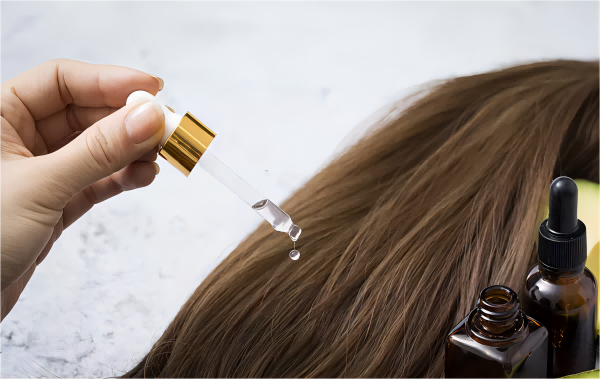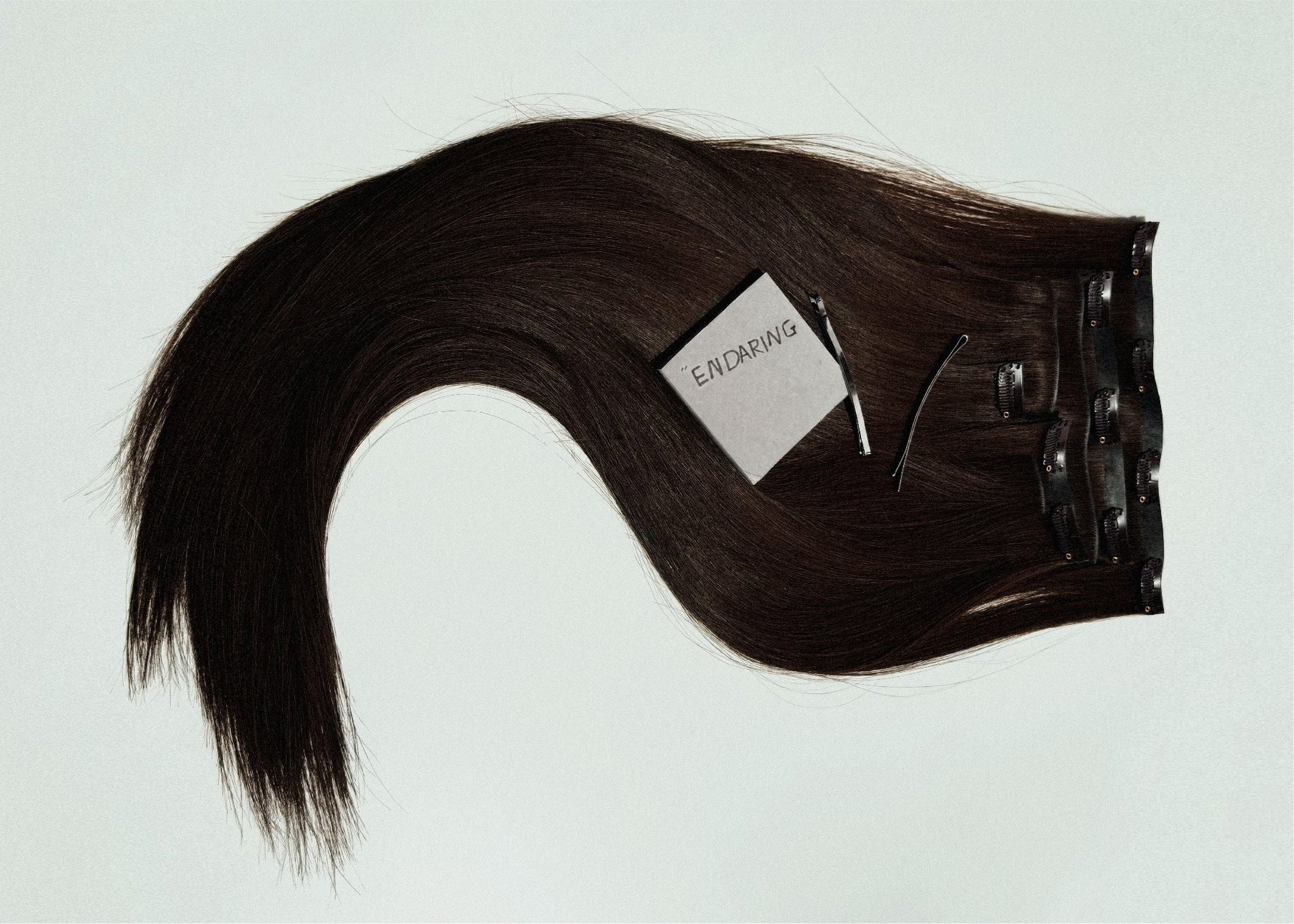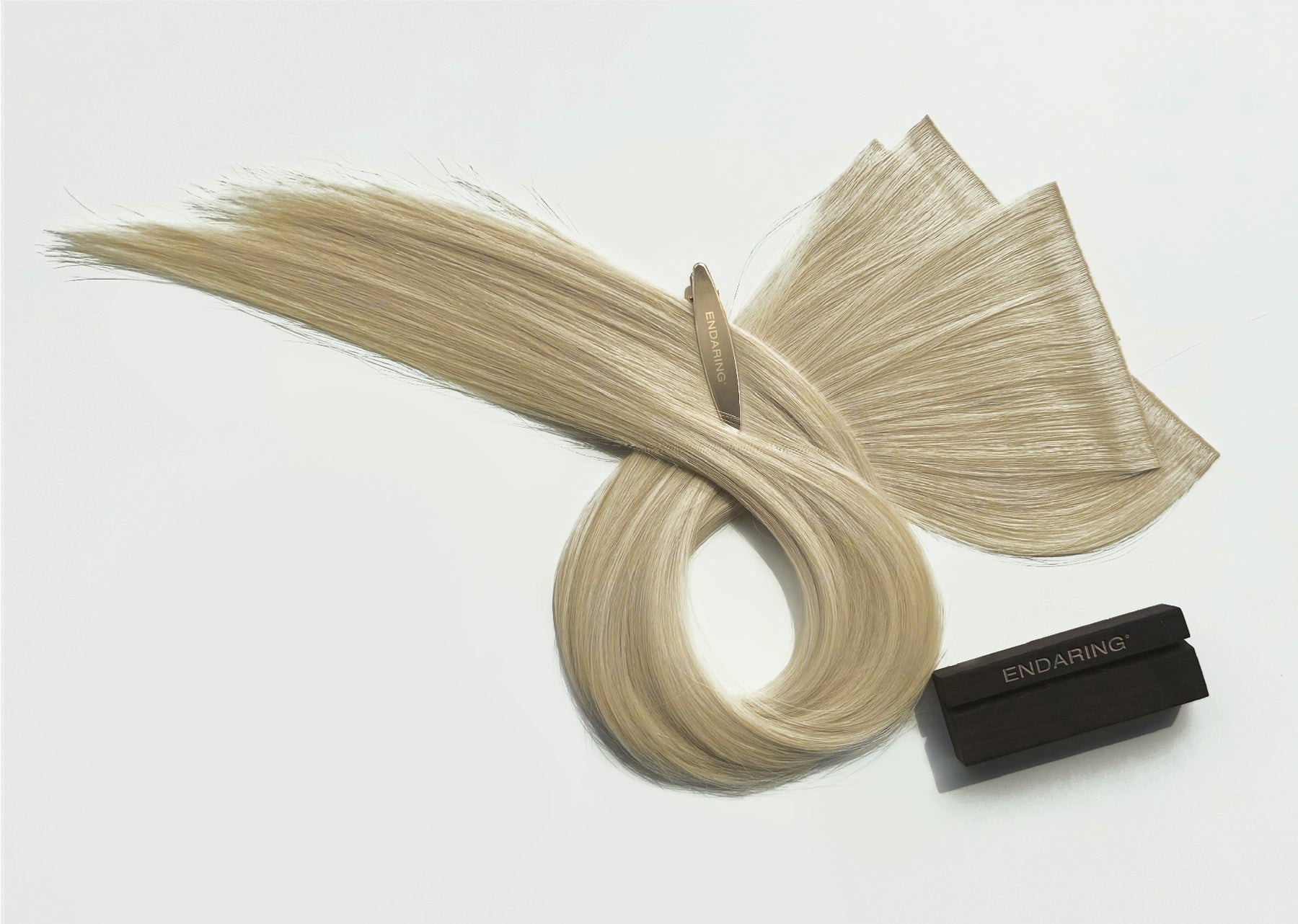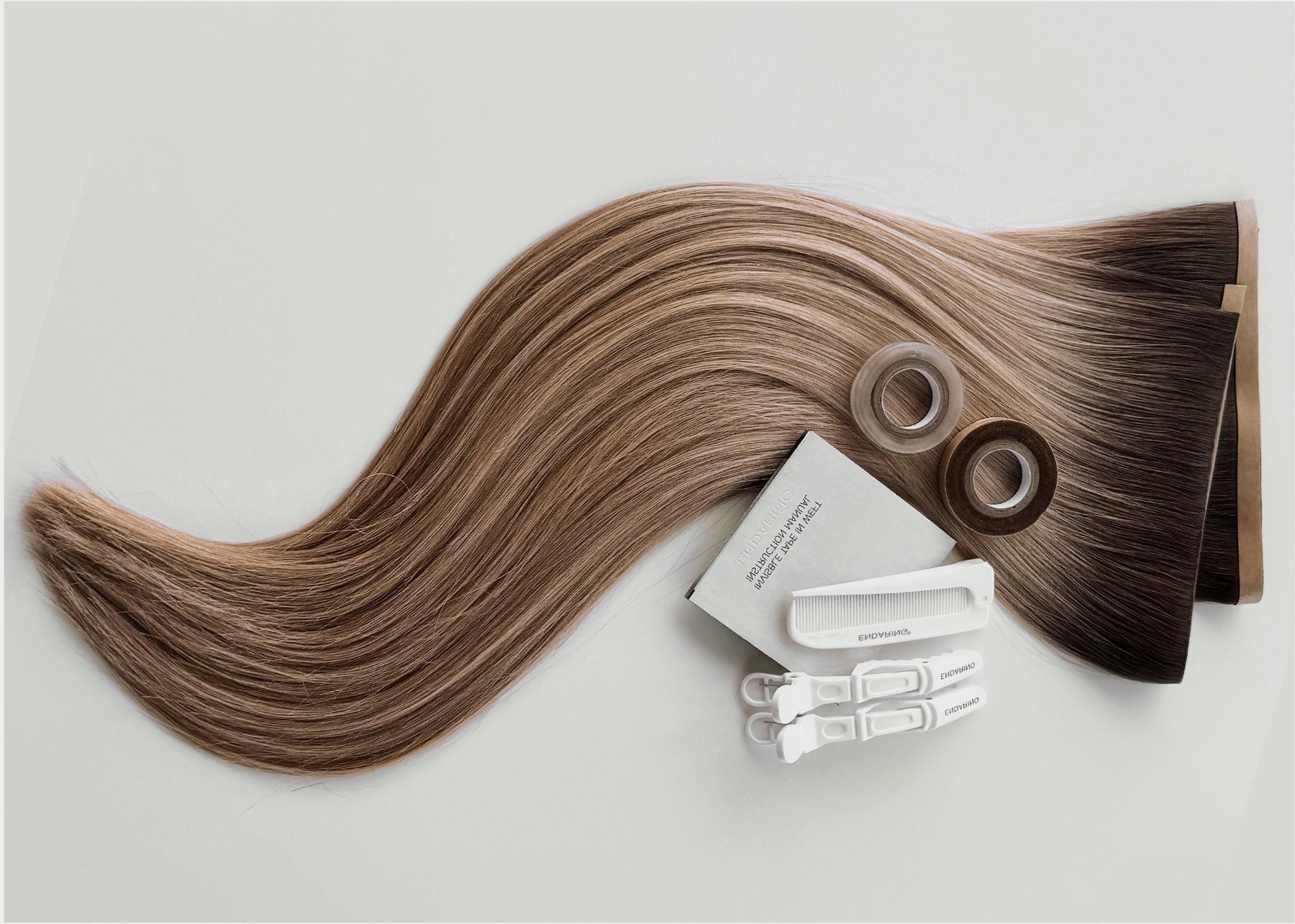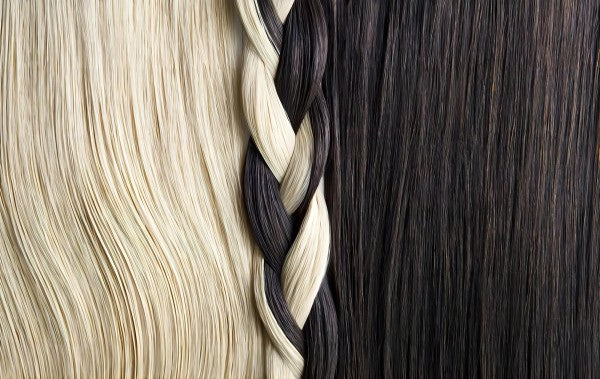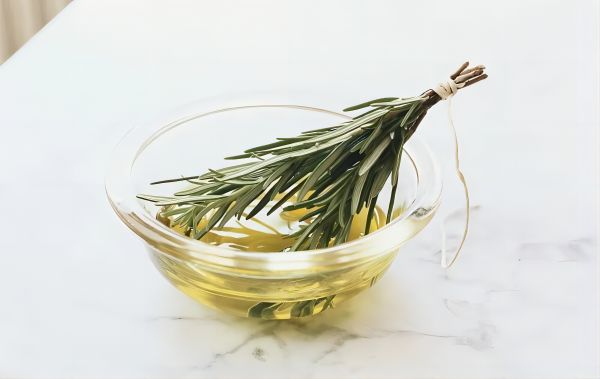Hair extensions offer a fantastic way to add length, volume, and even pops of color to your natural hair. Here, we delve into why incorporating hair oils into your extension care routine is not just beneficial but essential and what is the best oil for hair extensions.
Best Hair Oils for Extensions: Explaining the Importance
- Lack of Natural Oils
- Absence of Scalp Sebum: Unlike natural hair, extensions do not have a direct source of nourishment from the scalp's natural oils, known as sebum. This absence can lead to extensions becoming dry, brittle, and prone to breakage over time.
- Importance of Sebum: Sebum plays a vital role in moisturizing and protecting the hair shaft, keeping it supple, shiny, and resilient. Without this natural lubrication, extensions are more susceptible to damage from environmental stressors and styling tools.
- Replenishing Moisture
- Hydration Balance: Hair oils provide a crucial source of moisture to extensions, replenishing what they lack due to the absence of scalp oils. This helps prevent dryness, frizz, and split ends, ensuring that extensions remain soft, smooth, and manageable.
- Deep Conditioning: Certain oils, such as coconut oil and argan oil, have deep conditioning properties that penetrate the hair shaft, nourishing it from within. This restores moisture balance and improves the overall health and appearance of extensions.
- Enhancing Shine
- Reflective Properties: Hair oils create a protective layer on the surface of the hair shaft, enhancing its shine and luminosity. This gives extensions a healthy, vibrant appearance, making them blend seamlessly with your natural hair.
- Combatting Dullness: Over time, extensions can lose their luster due to exposure to environmental factors and styling damage. Regular use of hair oils helps restore and maintain their shine, ensuring they look fresh and radiant.
- Extending Lifespan
- Preventing Damage: By nourishing and strengthening the hair shaft, hair oils help protect extensions from damage caused by heat styling, friction, and environmental aggressors. This extends the lifespan of extensions, allowing you to enjoy them for longer periods without compromising their quality.
- Maintenance Investment: Incorporating hair oils into your extension care routine is an investment in their longevity and overall health. With proper maintenance, extensions retain their beauty and vitality, reducing the need for frequent replacements and saving you time and money in the long run.
How to Apply Hair Oil to Extensions: Tips and Tricks for Maximum Absorption
Applying hair oil to extensions is an art that requires understanding the right techniques for maximum benefit.
Navigating the application of hair oil to extensions with precision ensures they remain lush and vibrant. Here's a detailed guide to mastering this essential care technique:
Step 1: Choosing the Right Amount of Oil
- Quantity Matters: Start with a small amount—about 2-3 drops for finer extensions and up to a quarter-sized amount for thicker, coarser types. The goal is to lightly coat the hair without saturating it.
Step 2: Warming the Oil
- Enhancing Absorption: Warm the oil by rubbing it between your palms. This helps the oil penetrate the hair shaft more effectively. Ensure the oil is comfortably warm and not hot to avoid damaging the extensions.
Step 3: Application Technique
- Focus on the Ends: Begin by applying the oil to the ends of your extensions, as they're the oldest and typically the driest part. Use your fingers to gently work the oil upward, stopping midway through the hair length. Avoid the roots or bonds of the extensions to prevent slippage or adhesive breakdown.
- Even Distribution: Use a wide-tooth comb or your fingers to evenly distribute the oil through the hair. This ensures every strand benefits from the oil without clustering in specific areas.
Argan Oil and Extensions: A Match Made in Hair Heaven
Argan oil is a superstar when it comes to hair care, and its benefits for extensions are unparalleled. Here's a detailed look at why argan oil is often hailed as the ultimate elixir for extension care:

Nutrient-Rich Composition
- Vitamin E: Argan oil is famously rich in Vitamin E, a powerful antioxidant that helps protect the hair from free radicals and environmental damage. For extensions, this means less fading from UV exposure and a shield against pollutants that can degrade hair quality over time.
- Essential Fatty Acids: Argan oil contains a high concentration of oleic and linoleic acids. These essential fatty acids are crucial for maintaining hair hydration and elasticity. By keeping extensions well-nourished, they prevent brittleness and breakage, ensuring extensions remain supple and resilient.
Luxurious Shine and Softness
- Enhanced Luster: One of the most immediate benefits of argan oil on extensions is the significant boost in shine. The oil coats each strand, smoothing the cuticle and creating a reflective surface that gives hair a glossy, healthy appearance.
- Improved Texture: Argan oil's conditioning properties soften the hair, improving the texture of extensions. This makes them not only look more luxurious but also feel silkier to the touch, mimicking the natural softness of healthy hair.
Protection Against Heat and Environmental Stressors
- Heat Damage Shield: Regular use of styling tools can cause significant damage to extensions. Argan oil serves as a protective barrier, minimizing the impact of heat from blow dryers, straighteners, and curling irons. This is especially important for extensions, which, unlike natural hair, don't receive constant renewal from the scalp.
- Environmental Defense: The antioxidant qualities of argan oil also protect extensions from environmental stresses like sun exposure, extreme temperatures, and pollution. This comprehensive protection helps maintain the color integrity and overall health of the extensions, extending their lifespan.
Coconut Oil for Extensions: Deep Conditioning Secrets
Coconut oil is revered for its deep conditioning properties, but its use with extensions requires a nuanced approach.

Deep Conditioning Benefits of Coconut Oil:
Hydration and Nourishment: Coconut oil is renowned for its ability to deeply penetrate the hair shaft, providing intense hydration and nourishment to extensions. This helps restore moisture, softness, and shine to dry and damaged hair strands, making them more manageable and vibrant.
Strengthens Hair: The fatty acids present in coconut oil help strengthen the hair from within, reducing breakage and split ends. This is particularly beneficial for extensions, which may be subjected to frequent styling and manipulation.
Due to its richness, coconut oil should be applied sparingly to extensions. Using too much can weigh down the hair and make it appear greasy. Start with a small amount and add more if necessary, focusing primarily on the mid-lengths and ends.
Jojoba Oil: The Lightweight Miracle for Extension Care
Jojoba oil's similarity to the scalp's natural sebum makes it an ideal choice for extension care, particularly for maintaining the hydration balance without heavy buildup.

- Mimicking Natural Sebum
Scalp-Like Hydration: Jojoba oil's chemical composition closely resembles that of the natural oils produced by the scalp, known as sebum. This similarity allows jojoba oil to effectively hydrate extensions without leaving behind a heavy or greasy residue.
Balancing Moisture: By mimicking the scalp's sebum, jojoba oil helps maintain the optimal moisture balance in extensions, preventing them from becoming too dry or too oily. This is crucial for keeping extensions looking and feeling healthy over time.
- Lightweight Hydration
Non-Greasy Formula: Unlike heavier oils, jojoba oil is lightweight and quickly absorbed by the hair shaft, leaving behind no greasy residue. This makes it an excellent choice for extensions, as it provides hydration without weighing them down or causing buildup.
Flexible Application: The lightweight nature of jojoba oil allows for flexible application, making it suitable for all types of extensions, from fine to thick. It can be applied sparingly for a subtle hydration boost or more generously for deeper conditioning, depending on the extension's needs.
- Improving Flexibility and Preventing Tangling
Enhanced Flexibility: Jojoba oil softens and lubricates the hair shaft, making extensions more flexible and resistant to breakage. This helps prevent tangling and matting, especially in extensions that are frequently styled or worn for extended periods.
Tangle Prevention: By keeping the hair shaft smooth and hydrated, jojoba oil reduces friction between individual strands, minimizing the risk of tangling and making extensions easier to comb and style.
Almond Oil Benefits for Your Extensions: Nourishment and Shine
Sweet almond oil is a gentle, vitamin-rich option that can enhance the health and appearance of hair extensions.

- Gentle Nourishment
Vitamin-Rich Formula: Sweet almond oil is packed with vitamins E, A, and B, as well as essential fatty acids. These nutrients provide deep nourishment to extensions, promoting overall hair health and vitality.
Gentle Hydration: Almond oil is lightweight and easily absorbed by the hair shaft, making it an excellent choice for extensions. It hydrates the hair without weighing it down or leaving a greasy residue, ensuring extensions remain soft and manageable.
- Lightweight Shine
Natural Luster: Almond oil adds a natural shine to extensions, enhancing their appearance and giving them a healthy glow. Unlike heavier oils, almond oil provides a subtle sheen without making the hair look oily or weighed down.
Non-Greasy Formula: The light texture of almond oil ensures that extensions maintain their natural bounce and movement while still enjoying the benefits of added shine. This makes almond oil suitable for all types of extensions, from fine to thick.
- Smoothing the Hair Cuticle
Softening Texture: Almond oil helps to smooth the hair cuticle, resulting in a softer, silkier texture. This makes extensions easier to style and manage, reducing the risk of tangling and breakage.
Improving Manageability: By smoothing the hair cuticle, almond oil reduces friction between hair strands, making extensions less prone to tangling and matting. This improves overall manageability and prolongs the lifespan of extensions.
Benefits of Using the Best Oil for Hair Extensions: How It Transforms Your Look
Using the right hair oil on your extensions can dramatically transform their appearance and texture.
Dramatic Shine Enhancement
- Immediate Luster: The application of hair oil on extensions can quickly turn dull, lifeless strands into radiant, shiny locks. This is because oils smooth the hair cuticle, allowing light to reflect more uniformly across the hair surface, which instantly boosts shine.
- Long-Term Glossiness: Regular use of hair oil not only offers an immediate shine boost but also contributes to long-term luster by keeping the extensions well-moisturized and healthy.
Tangling and Frizz Reduction
- Easier Detangling: Hair extensions are prone to tangling due to lack of natural scalp oils. Applying the right hair oil eases the detangling process by lubricating the strands, reducing the friction that leads to knots and tangles.
- Frizz Control: Hair oil helps in controlling frizz by sealing the cuticle layer of the hair. This prevents the penetration of external moisture from the air which can swell the hair shaft and cause frizz, especially in humid conditions.
Softness and Texture Improvement
- Silky Smoothness: Beyond just making extensions softer to the touch, hair oils improve their overall texture. Extensions treated with oil are silkier and have a more natural feel, mimicking the texture of healthy, natural hair.
- Texture Enhancement for Styling: Improved texture not only feels better but also makes extensions more adaptable to various hairstyles. Oiled extensions can hold curls or stay straight for longer without looking stiff or artificial.
Environmental Protection
- Shield Against Damage: The right hair oil acts as a protective layer around each hair strand, shielding against UV radiation, pollution, and other environmental stressors that can fade color, cause dryness, and degrade the quality of the extensions.
- Moisture Retention: Oils help lock in moisture within the hair shaft, preventing the drying effects of the environment, which is particularly beneficial for extensions exposed to sun, wind, or dry air.
Seamless Integration and Manageability
- Blending with Natural Hair: Well-oiled extensions blend more seamlessly with natural hair, eliminating the line between extensions and the natural start of your hair. This creates a more cohesive and natural-looking hairstyle.
- Ease of Styling: Extensions that are regularly treated with hair oil are easier to manage and style. The added moisture and smoothness allow for easier brushing and styling, reducing the risk of damage from heat tools and styling products.
Avoiding Common Mistakes When Oiling Extensions
While oiling extensions have many benefits, there are pitfalls to avoid. This section outlines common mistakes, such as using too much oil, applying it too frequently, or choosing the wrong type of oil for your extensions. It offers advice on how to avoid these errors to ensure that oiling contributes positively to the extension's appearance and longevity, rather than causing greasiness, buildup, or slippage.
Using Too Much Oil
- Risk of Greasiness: Applying an excessive amount of oil to extensions can lead to greasiness, weighing down the hair and making it appear limp and oily.
- Precautionary Measure: Start with a small amount of oil and gradually increase if necessary. Remember, it's easier to add more oil than to remove excess, so err on the side of caution.
Applying Oil Too Frequently
- Buildup Concerns: Overusing oil can lead to product buildup on the extensions, causing them to become heavy, sticky, and difficult to manage.
- Balanced Approach: Limit oiling to once or twice a week, depending on the condition of your extensions and your hair's needs. Adjust the frequency as necessary to prevent buildup while still providing adequate hydration.
Choosing the Wrong Type of Oil
- Compatibility Issues: Not all oils are suitable for all types of extensions. Using the wrong type of oil can result in greasiness, buildup, or even damage to the extensions.
- Consider Extension Type: Choose an oil that is lightweight and easily absorbed, such as argan oil or jojoba oil, for most extension types. Avoid heavy oils like coconut oil for fine extensions, as they may cause buildup and weigh down the hair.
Neglecting the Ends
- Focus on Hydration: The ends of extensions are typically the driest and most prone to damage. Neglecting to oil them can result in dryness, split ends, and breakage.
- Thorough Application: Ensure that you apply oil evenly to the mid-lengths and ends of the extensions, focusing on areas that need extra hydration and nourishment.
Applying Oil to the Roots or Bonds
- Risk of Slippage: Oil applied directly to the roots or bonds of the extensions can weaken the adhesive and cause it to slip or become loose.
- Avoidance Strategy: Keep oil away from the roots and bonds when applying to extensions. Focus on the mid-lengths and ends, where moisture is most needed, to prevent any adverse effects on the attachment points.
Not Washing Out Excess Oil
- Residue Concerns: Failure to properly wash out excess oil can result in residue buildup on the extensions, making them sticky, dull, and prone to attracting dirt and debris.
- Thorough Cleansing: If you accidentally apply too much oil or notice any greasiness, wash your extensions with a gentle, sulfate-free shampoo to remove the excess oil without stripping away moisture.
